Elena had never seen the world, but she could feel its weight in every breath she took. Born blind into a family that quietly valued appearances, she often felt like a misplaced piece of a perfect puzzle. Her two sisters, Leila and Samira, were admired for their radiant beauty and elegant grace. Guests would gush over their sparkling eyes and lovely manners, while Elena stayed quietly in the shadows, barely acknowledged.

Her mother was the only one who treated her with warmth. But after she passed away when Elena was just five years old, the house changed. Her father, once a man of mild words, turned cold and withdrawn. He never called her by name again. Instead, he referred to her vaguely, as though even acknowledging her existence was an inconvenience.
Elena didn’t eat meals with the family. She was kept in a small back room, where she learned to navigate her world through touch and sound. Books in braille became her escape. She would sit for hours, fingers tracing the bumps that told stories far beyond the reach of her world. Her imagination became her greatest companion.
On her twenty-first birthday, instead of a celebration, her father walked into her room with a folded cloth and a short sentence: “You’re getting married tomorrow.”
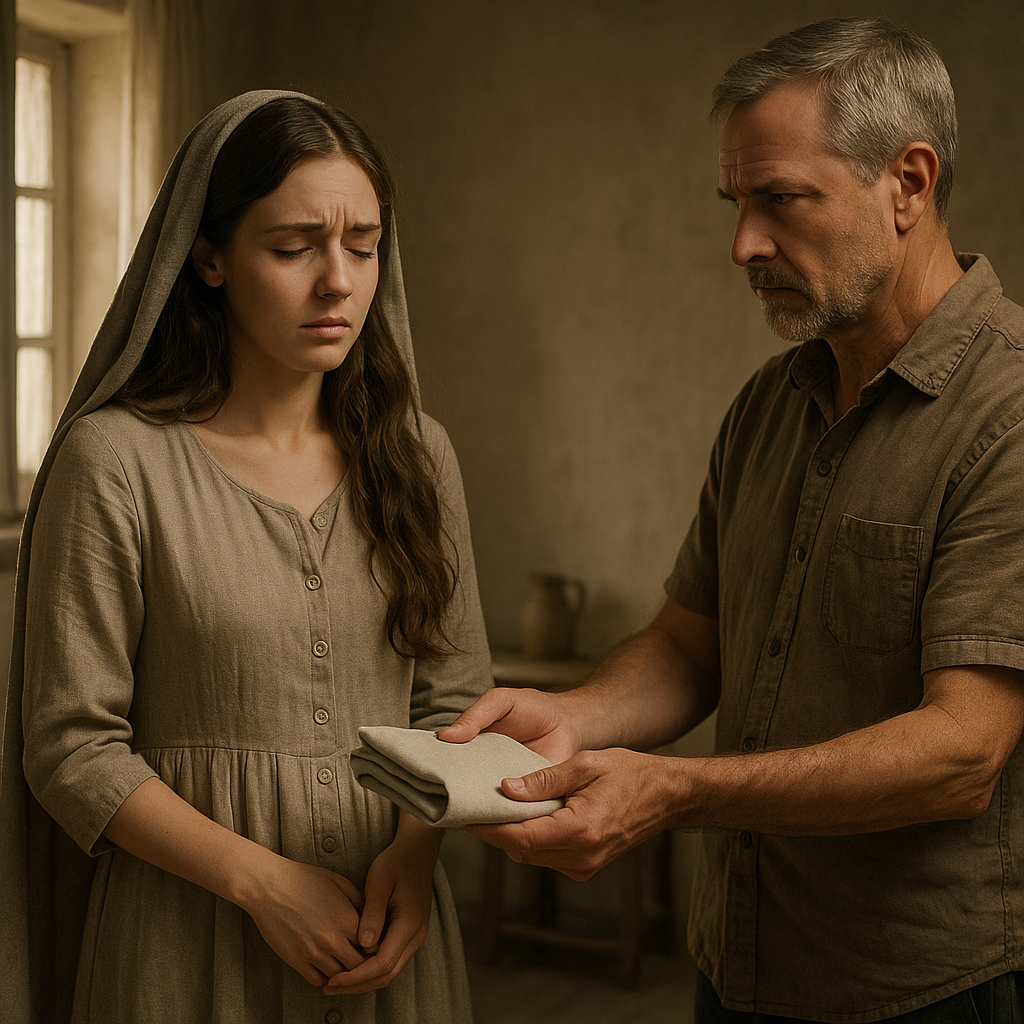
Elena froze. “To whom?” she asked softly.
“He’s a man who sleeps outside the village chapel,” her father replied.
“You’re blind. He’s poor. Seems fair enough.”
She had no say in the matter. The next morning, in a brief, emotionless ceremony, Elena was married. No one described her husband to her. Her father simply pushed her forward and said, “She’s yours now.”
Her new husband, Jonas, guided her to a modest cart. They traveled in silence for a long while, until they arrived at a small cabin near the river, far from the bustle of the village.
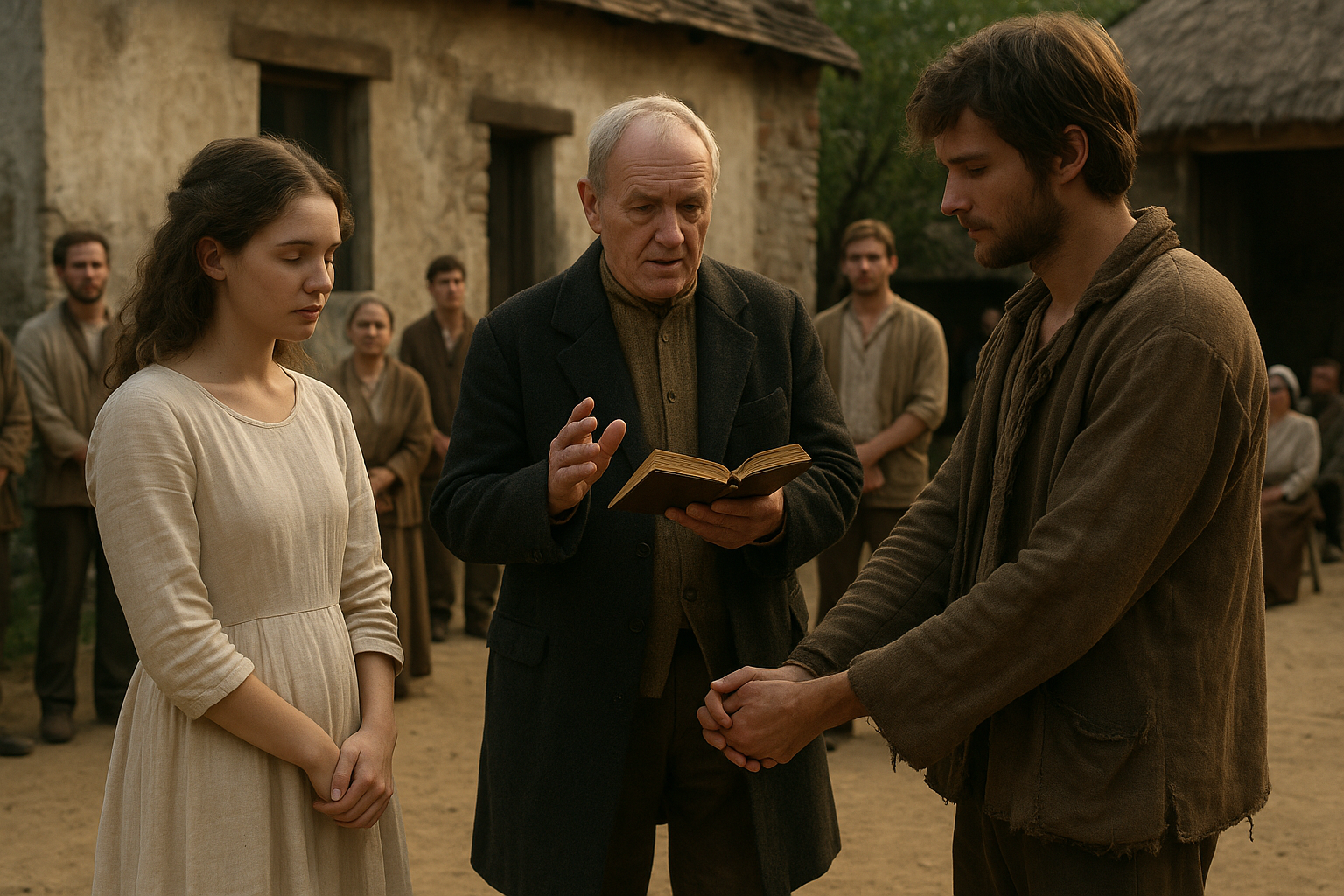
“It’s not much,” Jonas said gently, helping her down.
“But it’s safe, and you’ll always be treated kindly here.”
The cabin was made of wood and stone, and though simple, it felt warmer than any room Elena had known. That first night, Jonas made her tea, offered her his blanket, and slept by the door. Not once did he raise his voice or treat her with pity. He simply sat and asked, “What stories do you love?”
She blinked. No one had ever asked her that before.
“What foods make you happy? What sounds make you smile?”
Day by day, Elena felt herself come alive. Jonas would walk her to the river each morning, describing the sunrise in poetic detail. “The sky looks like it’s blushing,” he once said, “like a secret has just been whispered to it.”
He described the chirping of birds, the rustle of trees, the scent of wildflowers blooming nearby. And he listened. Truly listened. In that little home, surrounded by simplicity, Elena found something she had never experienced: joy.
She began to laugh again. Her heart, once guarded, slowly opened. Jonas would hum her favorite tunes, tell her stories of distant lands, and sometimes just sit in silence with her hand in his.
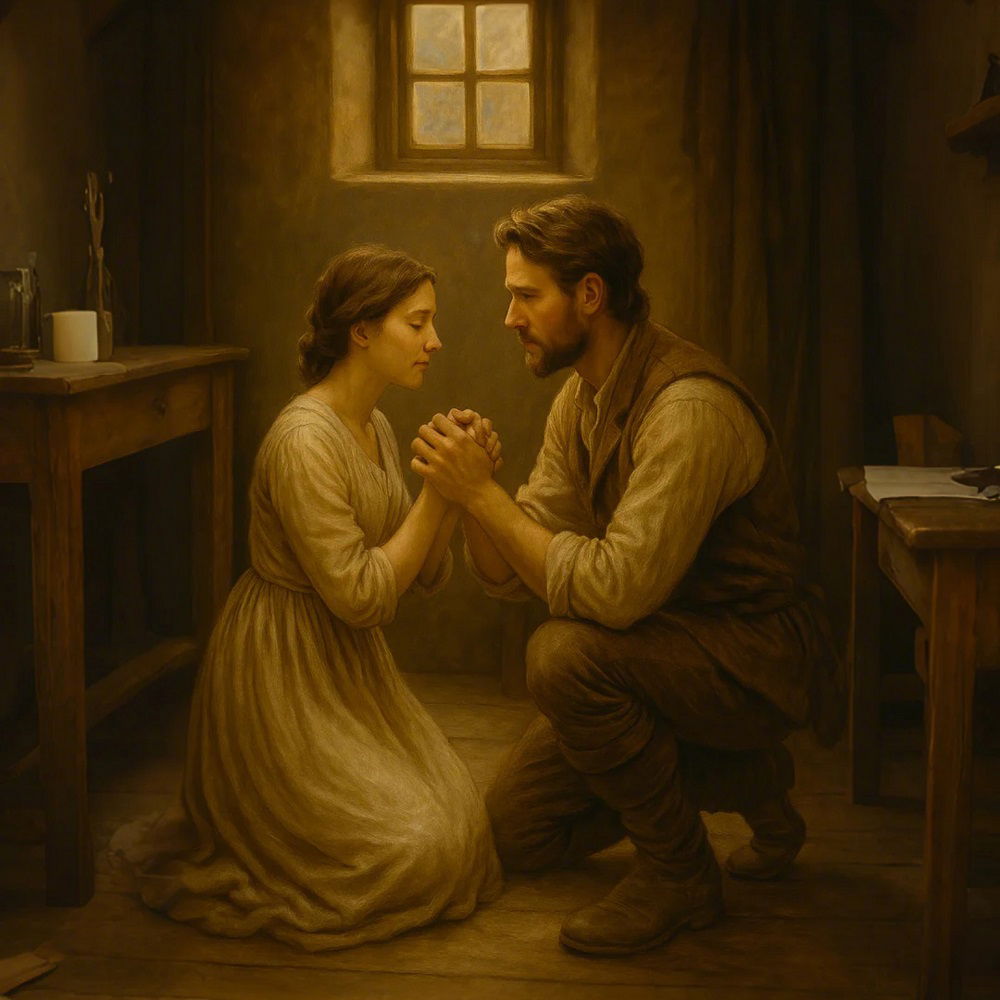
One day, as they sat beneath an old tree, Elena asked him, “Jonas, were you always a beggar?”
He was quiet for a moment. Then he replied, “No. But I chose this life for a reason.”
He said no more, and she didn’t push him. But a seed of curiosity had been planted.
Weeks later, Elena ventured to the village market on her own. Jonas had carefully taught her the way, guiding her with patience. She moved through the streets with a calm confidence, but then a voice startled her.
“Blind girl, still pretending to play house with that beggar?”
It was her sister, Samira.
Elena stood tall. “I’m happy,” she said.
Samira scoffed. “He’s not even a beggar. You really don’t know, do you?”
Elena returned home confused. That evening, when Jonas entered, she asked quietly but firmly, “Who are you really?”
Jonas knelt beside her, taking her hands. “I didn’t want you to find out like this. But you deserve the truth.”
He took a deep breath. “I’m the son of a regional governor.”
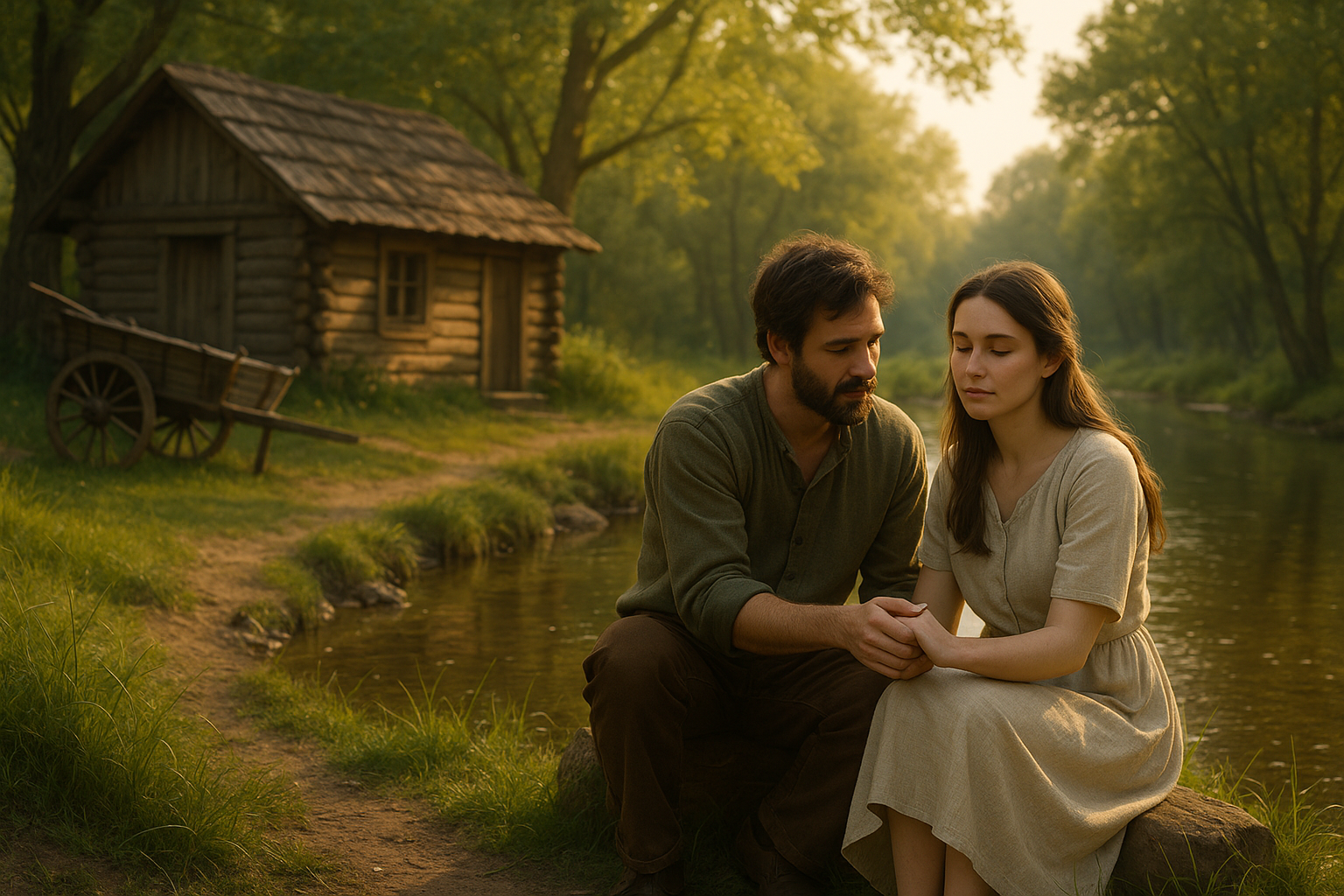
Elena froze. “What?”
“I left that life because I was tired of being seen for my title. I wanted someone to love me for who I am. When I heard about a blind girl who had been cast aside, I knew I had to meet you. I came in disguise, hoping you’d accept me without the weight of wealth.”
Elena sat in stunned silence. Her mind raced through every memory, every kindness, every moment they had shared.
“And now?” she asked.
“Now, you come home with me. To the estate. As my wife.”
The next morning, a carriage arrived. Servants bowed as they passed. Elena, holding Jonas’s hand tightly, felt a mix of fear and wonder.
At the grand home, family and staff gathered in curiosity. The governor’s wife stepped forward. Jonas spoke clearly.
“This is my wife. She saw me when no one else did. She is more genuine than anyone I’ve ever known.”
The woman looked at Elena, then slowly embraced her. “Welcome home, my daughter.”
In the weeks that followed, Elena learned the rhythms of estate life. She established a reading room for the blind and invited local artists and craftmakers with disabilities to share their work. She became a beloved symbol of strength and kindness.
But not everyone was welcoming. There were whispers. “She’s blind.” “How can she represent us?”
Jonas heard it all.
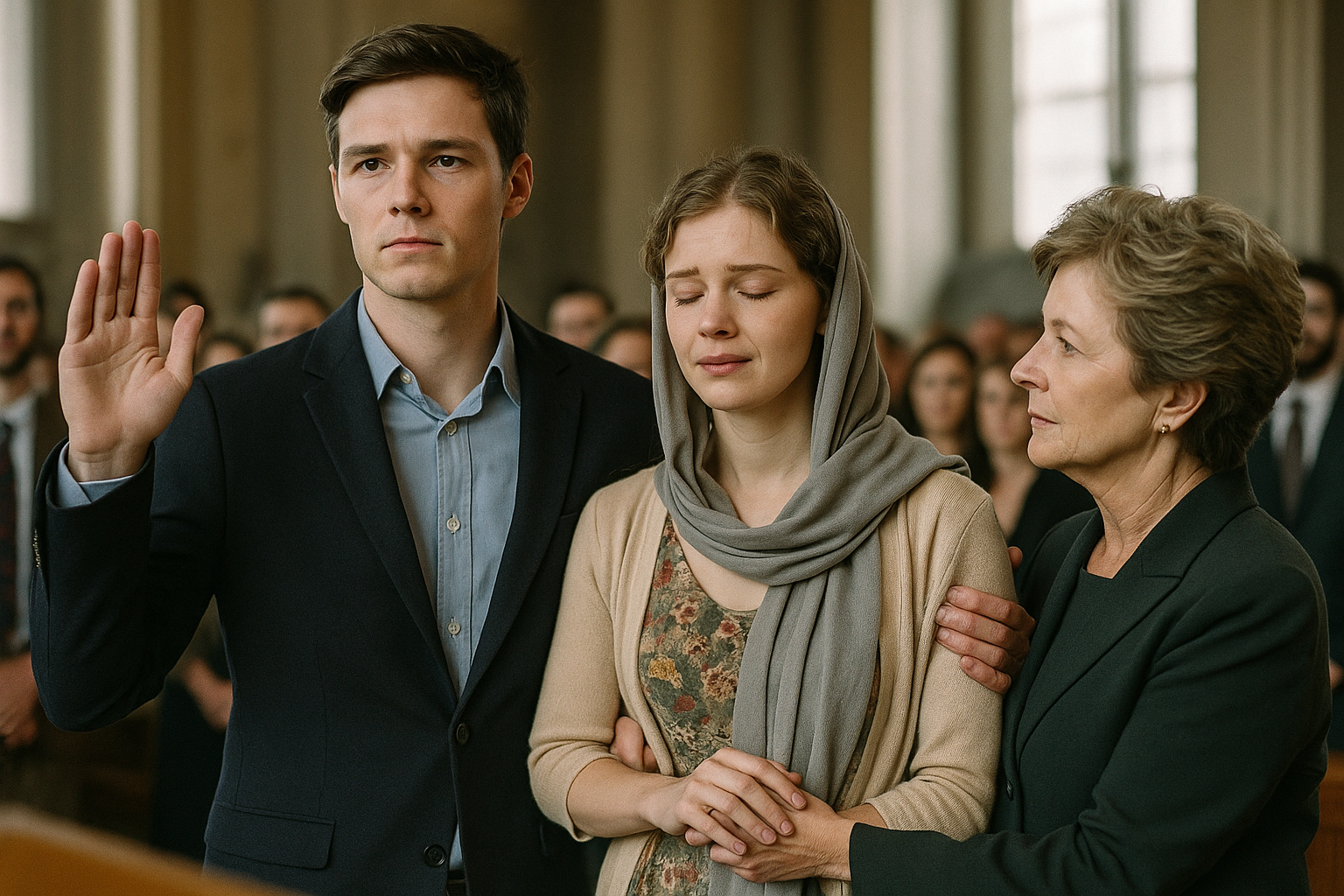
At a formal gathering, he stood before the assembled guests. “I will not accept my role unless my wife is honored fully. If she isn’t accepted, I will leave with her.”
Gasps filled the room.
Then the governor’s wife stood. “From this day forward, let it be known: Elena is a part of this house. To dishonor her is to dishonor our family.”
Silence followed. And then, applause.
That night, Elena stood at the balcony of their room, listening to the wind carry music across the estate. She had once been a girl left in silence. Now, she was a voice others listened to.
And though she could not see the stars above, she felt their light in her heart—a heart that had found its place.
She had once lived in shadows. But now, she shone.
This work is inspired by real events and people, but it has been fictionalized for creative purposes. Names, characters, and details have been changed to protect privacy and enhance the narrative. Any resemblance to actual persons, living or dead, or actual events is purely coincidental and not intended by the author.


